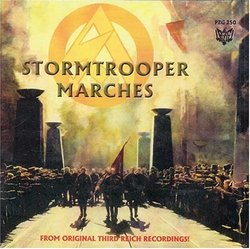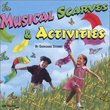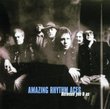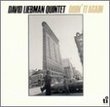| All Artists: Original Third Reich Nazi Recordings Title: Stormtrooper Marches Members Wishing: 1 Total Copies: 0 Label: PzG Inc. Original Release Date: 6/6/2003 Release Date: 6/6/2003 Genres: International Music, Classical Style: Number of Discs: 1 SwapaCD Credits: 1 UPC: 643157184522 |
Search - Original Third Reich Nazi Recordings :: Stormtrooper Marches
 | Original Third Reich Nazi Recordings Stormtrooper Marches Genres: International Music, Classical
Share a moment in history with the German soldier on the front where the sound of rousing martial music gave new strength to flagging morale or in a bomb shelter with civilians where encouraging music calmed racing hear... more » |
Larger Image |
CD DetailsSynopsis
Album Description Share a moment in history with the German soldier on the front where the sound of rousing martial music gave new strength to flagging morale or in a bomb shelter with civilians where encouraging music calmed racing hearts. More then a CD its an audio history lesson of WWII, Adolf Hitler and his Nazi Third Reich. With quality you can trust, PzG nazi songs and marches are factory produced from ORIGINAL Third Reich recordings and professionally re-mastered for even listening with a musical balance between instrumental and choral marches. A Powerful musical collection for everyone interested in the heroic men and music of WWII. Similar CDs
|
CD ReviewsExcellent Original Recordings S. Wenzel | Northridge, CA United States | 01/23/2005 (5 out of 5 stars) "For perhaps the first time, a CD has been issued that presents music of the Nazi era in Germany as it was heard on radio programs and in theater newsreels of the day. I have owned LP records made from original recordings of this music, but many of them were of poor quality, as they mainly copied from transcription discs that were either badly decayed with age or damaged, due to poor storage and handling. However, this CD offers recordings made from superior quality original sources and an excellent job was done in the remastering process. Back in the late 1960s and early 1970s, when recordings of this sort were being reissued on LP records, the various selections were often accompanied by over dramatic narrations by various commentators. This CD allows the listener to draw his/her own conclusions about the music. In listening to the selections presented here, one can see how skillfully the Nazi propagandists used martial and folk music to generate the feverish loyalty and nationalism one sees in the huge crowds in films of the big Nuremberg rallies. Not all the selections on this disc originated during the Nazi era. This is especially true of the "Badenweiler Marsch", which originated during the WW1 years and was extremely popular. It was a favorite of Hitler's, and was only played when he was in the immediate vicinity. This disc also contains the best original recording of "Weichsel und Warthe" I've ever heard. Yes, there are occasional volume drops in some of the selections, but they are very brief and do not interfere with the music to any great degree. Of course, you have to expect, at least, alittle deterioration in masters that are 60 to 75 years old. For the those of a historical frame of mind, who want to hear the sort of music the average man in the street was almost constantly exposed to, this CD is a must-have. WARNING: Many of the selections on this CD contain song lirics that express Nazi idiologies. If you are of a sensitive nature and find this material offensive, do not purchase this album. However, if you are a student of this period in Germany's history, this album is a necessary addition to your historical audio collection. Truly an excellecnt value." ECHO OF THE PAST Marc Roland | Minneapolis, MN USA | 06/01/2005 (5 out of 5 stars) "It seems remarkable that the music on this c.d., once familiar to the entire German people, was so purged from their culture in the post-war period that the songs and instrumentals performed during Hitler's struggle for power seemed to have utterly vanished. Throughout the last half of the 20th Century, collectors seeking these rare recordings considered themselves fortunate indeed to find a relatively undamaged copy of the Nazi Party's formerly ubiquitous anthem, the Horst Wessel Song, or the Fuehrer's personal favorite, the Badenweiler March. In view of such long-term scarcity, they must feel very fortunate to have at their disposal the twenty three selections, all performed and recorded in the original circumstances of the 1920s and `30s, presented on PZG's "Stormtroop Marches". Not only does it feature the Horst Wessel Song and Badenweiler, but far less well-remembered numbers, such as the "Stahlhelm Bundesmarsch" and "Franz Seldte". Both refer to the "Steel Helmet", an organization of World War One veterans, who allied themselves with the Nazi Party, and voluntarily abolished their group after the National Socialist "Seizure of Power" on 30 January 1933. These two marches are like many of the selections, in that they originated during Hitler's early political struggle, and reflect that period. For example, the "SA Totenmarsch", or Stormtrooper funeral march, accompanied the hundreds of men, women and children who fell in street battles against their numerous opponents. Their sacrifice echoes in "Als die goldnen Abendsonne" ("As the golden evening sun", which tells of the body of an SA man carried by his comrades to the grave; "Ich hatt' einen Kameraden" (I once had a comrade"), a popular First World War dirge performed here by an SA Band; and "In Muenchen sind viele gefallen" ("In Munich many have fallen"), dedicated to the sixteen National Socialist demonstrators shot by government forces in 1923. These dark harmonies are contrasted by the up-beat "Heide Marie", about a Stormtrooper's girl friend he cannot forget, even when he's marching along the banks of the Rhein, or "Am Adolf Hitler Platz", a plaza where Germans can escape the depression of Weimar democracy. More typical are "Volk ans Gewehr" ("Folk, take up arms!"), "Es zittern die morschen Knochen" ("The rotten skulls are decaying") and "Die Braune Kompanie" ("The Brown Company"), which surge with iron fortitude and grim determination. As such, this collection accurately reflects the times in which they were recorded. They are beyond duplication, and cannot be identically performed today, because the spirit that motivated them is absent from these times. Listeners in search of the most hard-driving, militant music, or history students anxious to know what Hitler's rise to power really sounded like will find "Stormtrooper Marches" a real-life echo of the past that can still stir emotions, one way or the other." SA to the front! M. G Watson | Los Angeles | 02/14/2006 (4 out of 5 stars) "One of the most neglected subjects in regards the Third Reich is that of the SA, better known to history as the Stormtroopers or the Brownshirts. Armed with nothing more than their fists (and the occasional chair-leg or beer mug), these fight-loving brawlers, many of whom were veterans of the trenches of WWI, eventually bested their opposite numbers in the Communist Redfront and the Social Democratic Reichsbanner and won the streets of Germany's cities for Adolf Hitler's National Socialist Party. No sooner had they paved his way to power, however, than they were ruthlessly discarded, their revolutionary ideology and stubborn independence being too much for either Hitler or the German army to stomach. How would Nazi
Germany have evolved if these truly socialist revolutionaries had their way we can only wonder, but you can tell a lot about a man by the type of music he favors, and "Stormtrooper Marches" is a fascinating listen. The album, compiled by Michael Kelly, packs 23 tunes comprising 1 hour 6.2 minutes of music, a mixture of choral renditions and instrumentals. There are some true classics here, including the anthemic "Horst Wessel Lied", the fiercely emotional "Du braune Kompanie" & "Volk und Gewehr" (People and Arms), and the exuberantly sentimental "Am Adolf Hitler Platz", "Wir Sind Die braunen Soldaten" (We Were the Brown Soldiers) and "Der Fuehrer Ruft SA -SA Voran!" (The Leader Shouts 'SA' - 'SA' to the front!). "Here Tremble the Rotten Bones" (Es zittern die Morschen Knochen) adds a playful note, as does "Heidemarie", but the solemn, funeral side is also well represented: "In Muenchen sind viele gefallen" is painfully grim, as is the "SA Totenmarsch" and the ancient farefell to fallen comrades, "Ich hatt' ein Kamerad" (from the early 19th century). One of my personal favorites, combining a sort of hopeless sentimentality with powerful imagery, "Als die Goldner Abendsonne" is also included. Finally, fans of the foot-stomping "Panzerwagen Lied" immortalized by Robert Shaw's tank crews in "The Battle of the Bulge" will enjoy the similar and quite authentic sound of the "Es pfelt von allen Daechern-SA" (It Whistles from all the Rooftops). In all, there are 15 choral and eight instrumental songs. Fans of 1920s - 1940s movies will recognize the exuberant, trumpet-laden instrumentals as the style of the day, and not merely Germany. I swear that you could exchange "Franz Seldte" with the soundtrack of Eroll Flynn's "Robin Hood" any day of the week. What surprised me, and may surprise other first-time listeners, is how little bellicosity and aggression exists in the songs or their lyrics. They are either gushingly sentimental, sad-but-solemn or out-and-out funny. In short, the very type of music a large group of men would prefer to sing while drinking lots and lots of beer (I dare you to listen to "Victory March of the Awakened Nation" without picturing rows of swaying half-drunken stormtroops, crammed elbow-to-elbow at a beer-hall table and pounding down Lowenbrau). I must say that this album, while very good, is inferior in my opinion to "Das Dritte Reich 1: SA", which is also available from Michael Kelly but not, apparently, on Amazon. That is a matter of my own personal taste, since I prefer lyrical songs to instrumentals and "Das Dritte Reich", while three songs shorter, has more chorals than instrumentals (I simply refuse to use the word "polka" when describing an SA song....you say "polka" and I'm looking for John Candy with an accordion). The SA is long extinct, and in comparison with its successor the SS, virtually forgotten. When one pictures "Brownshirts" the immediate image is of thugs bashing in a shop-owners' window -- and indeed this was no doubt often the case in the Germany of the 1920s. But "Stormtrooper Marches" presents us with the other side of the coin, the boisterous and rollicking spirit of a social revolution which drew the most extraordinary miscellany of thrill-seeking brawlers, embittered ex-soldiers, fervent nationalists, ardent communists, militant socialists and free-booting mercenaries, and set them out onto hard streets to fight for a revolution which was ultimately and cynically betrayed. " |

 Track Listings (23) - Disc #1
Track Listings (23) - Disc #1


